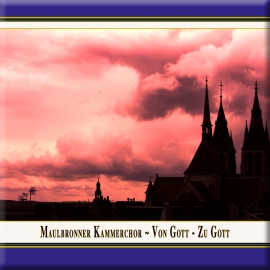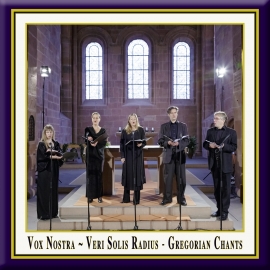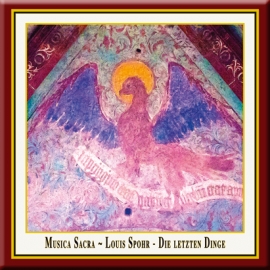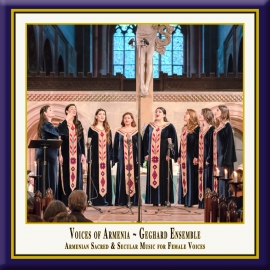
A rich Messiah of unusually strong Impact
They produced in the hands of conductor Jürgen Budday a rich Messiah of unusually strong impact... aided by fine live engineering in the impressive, sonically clear spaces of Germany's Maulbronn Monastery...
This live German recording of Messiah is based on a manuscript Handel marked up for a performance of the work in Dublin, adding a variety of new dynamic markings and ensemble indications. There's no reason to regard it as quite the definitive version of the work that it is proposed to be by the booklet here; it can equally well be considered an experiment on Handel's part in dealing with the new stylistic currents of his day. For listeners unfamiliar with it, this version carries quite a few surprises. Sampling merely the beginning of the "Hallelujah" chorus, CD 2, track 16, is enough to give the listener an idea of what he or she is getting into as the usually muscular entrance of the choir contracts to a quiet, angelic effect. The work becomes much more varied in texture and a good deal less monumental overall.
It would nevertheless be a shame if this recording were pigeonholed among the Dublin versions, for it has a good deal to offer any Messiah listener. Billed as an uncut, historically informed performance, this recording becomes, in the hands of conductor Jürgen Budday, a nice fusion of the immediate feel of the best historical performances (aided by fine live engineering in the impressive, sonically clear spaces of Germany's Maulbronn Monastery) with a rich, more conventional sound from a good-sized German choir, the Maulbronner Kammerchor.
Budday gives the soloists a chance to stretch out in the recitatives. Collectively the performers capture the different strands of Handel's experience - operatic, English Protestant, solo-oriented, and instrumental - that he brought to bear on this magnificent work, and they produce a rich Messiah of unusually strong impact. The live recording has a few flaws, but they are more than overcome by the edge thus generated. Notes are in German and English, the text is in English.
Review by James Manheim - All Music Guide, allmusic.com

***** Absolutely the finest rendition
I am nearly 60 years old and have heard countless versions of Handel's "Messiah" since I was a boy. Recently I decided to purchase the best recording I could find for MP3 use. Wanting the version most faithful to Handel's baroque style, I easily eliminated most of the recordings I "auditioned" due to the overuse of orchestration, usually performed by unauthentic modern instruments. I also did not want to listen to any more wobbly warbling of soloists who seemed to be more intent on overpowering the listener than on communicating the divine message of the scripture text. Nor did I wish to hear any more sloppy choral performances that muddy the words because of the choir size and poor attack.
I had heard other recordings done with "authentic" or "antique" instruments, some of which are fine, but usually one or two of the soloists have left me disappointed. This version has satisfied every one of my wishes. Where have they been hiding? It is totally delightful, and I have no complaint. I can only hope that more persons will become aware of this recording and add their two bits of comments.
If you are one of those persons who enjoys heavy vibrato and heavy orchestration, you might not appreciate this fine Baroque recording. But if you are tired of the same old..... then by all means, give it a try. It is refreshing!
'Monergistic Reader' on Amazon.com

***** Superlative
I've heard many, many versions of "Messiah" in my short 27 years, and this is by far the best. One need only listen to the "Hallelujah Chorus" to appreciate this recording - it is at once intimate and majestic. The restraint that the choir demonstrates in the beginning is remarkable, considering that that chorus is normally an unwieldy, overwhelming, incomprehensible mess. It's not lacking for majesty and bombast, but it's there at appropriate places.
'Dweeb' on Amazon.com

***** A clear, beautiful, authentic Messiah
An absolute gem of a Messiah. Definitely in the stream of the great "authentic" recordings of the work (like Christopher Hogwood's fantastic recording so many years before), this one makes the most of a small orchestra and chorus. The performances are all wonderfully beautiful, from the orchestra and the crystal-clear soloists to the all-male choir. There is an elegant restraint shown in this recording that sets it apart, even amongst some of its contemporaries in the authentic-arrangement camp; This is particularly notable in "Hallelujah". Don't confuse elegance and restraint for dull and boring, however. It is anything but that. This version transports the listener. The sound quality is pristine and, recorded live in concert in a large church, captures the wonderful resonance that atmosphere uniquely provides. This is a lesser-known Messiah that stacks up well against other, more noted performances.
Jacob A. Davis on Amazon.com

 Dear friends of audiophile music,
Dear friends of audiophile music, 





























